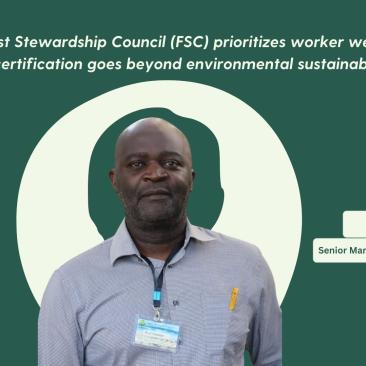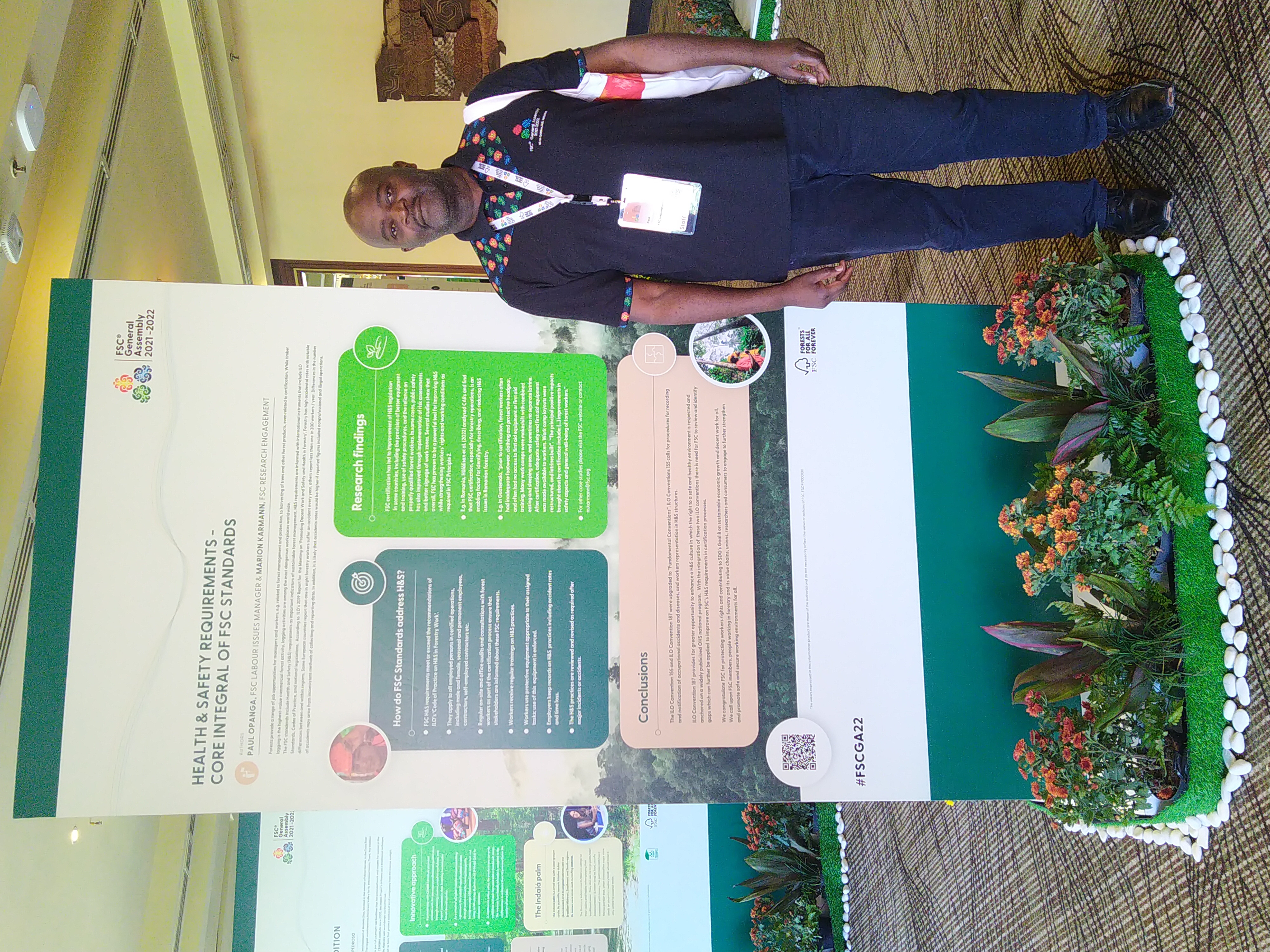
According to the International Labour Organization (ILO), global warming is exposing workers around the world to increased risk of hazards. These include excessive heat, ultraviolet radiation, extreme weather events, air pollution, vector-borne diseases and agrochemicals.
Labour rights and decent work conditions are essential to sustainability. The Forest Stewardship Council® (FSC®) has put labour issues at the forefront of its standards, requiring certificate holders to meet core labour requirements to keep their certificates.
In observance of World Day for Safety and Health at Work (28 April 2024) and Workers’ Day (1 May 2024), we are pleased to present an exclusive interview with Senior Manager, Labour Affairs, FSC, Paul Opanga.

1. Labour issues are central to FSC. Which Principles and Criteria in the FSC Standards address labour issues?
The Forest Stewardship Council (FSC) prioritizes worker well-being. This is evident in Principle 2 of the FSC Principles and Criteria for forest stewardship, which guarantees that workers' rights are respected and upheld throughout forests and plantations supplying FSC-certified products. Principle 2 lays out essential principles and rights at work, which include four core principles of work rights:
- No child labour
- No forced or compulsory labour
- No discrimination in employment and occupation
- Freedom of association and collective bargaining
FSC certification champions worker rights
FSC certification goes beyond environmental sustainability. It also prioritizes responsible labour practices throughout the forestry process. Here's how:
Gender equality: FSC actively promotes equal opportunities and fair treatment for all workers, regardless of gender.
Safety first: Strict adherence to legal occupational health and safety practices is mandatory. Additionally, FSC follows the ILO Code of Practice for safety and health in forest work, ensuring a high standard of worker protection.
Fair compensation: FSC ensures workers receive fair wages that meet or exceed minimum wage requirements.
Skill development: FSC emphasizes the importance of suitable training for workers. This job-specific training empowers them to perform their duties safely and effectively.
Grievance resolution: A robust grievance handling procedure is in place to address worker concerns and ensure fair resolutions. Compensation for loss or damage is also a requirement.
Recognising importance of health and safety, FSC promotes health and safe working conditions, and key requirements include:
- FSC health & safety requirements meet or exceed the recommendations of ILO Code of Practice on health and safety in forestry work
- Workers receive regular training in health and safety practices.
- Workers use protective equipment appropriate to their assigned tasks; the correct equipment is enforced.
- Employers keep records of health and safety practices including accident rates and time loss.
- Health and safety practices are reviewed and revised after major incidents and accidents.
FSC ensures health and safety issues are addressed through regular on-site and office audits. They also consult directly with forest workers as part of the certification process.
2. This year's theme is “the impact of climate change on occupational health and safety”. What are the innovations within the FSC system that address the emerging challenges related to climate change?
This year's theme for the Day for Safety and Health underscores the growing threat climate change poses to worker well-being. Forest workers, along with many others globally, face increased risks from extreme heat, weather events, back-borne diseases, and agrochemicals.
FSC's multi-stakeholder approach strengthens health and safety requirements by incorporating diverse perspectives. FSC principles and criteria are regularly reviewed, and a plan is in place to assess worker representation in health and safety structures (as mandated by General Assembly Motion 51). A Technical Working Group (TWG) is also envisioned to address this area.
Recognizing the importance of Personal Protective Equipment (PPE) in harsh conditions, FSC actively observes discussions on its role in mitigating climate risks. Emerging best practices on worker discussions related to work hours and flexible schedules are being considered as potential revisions to FSC Principles and Criteria (P&C).
Furthermore, FSC recognizes the critical role of reskilling and retraining in helping workers adapt to climate change. This aspect is at the forefront of discussions around a "just transition" in the forestry sector.
FSC's strength lies in its multi-stakeholder engagement. Economic, environmental, and social actors participate in ongoing dialogue and consultations on health and safety. FSC actively collaborates with labour institutions like the ILO, trade unions, and research bodies. This commitment continues with FSC's participation as an observer in the upcoming 13-17 May, 2024 meeting of experts in Geneva, Switzerland, focused on updating the 1998 ILO Code of Practice on Safety and Health in Forestry Work.
3. You have been involved in labour issues for many years. What are the key labour issues in the African context and how is FSC addressing them?
FSC requirements take labour issues seriously. They require addressing these concerns through both process and content.
- Social stakeholder participation: Meaningful participation by social stakeholders, particularly trade unions, is crucial. Open discussions during standard development processes help clarify core labour requirements within specific national contexts. For example, minimum age for work is already well-defined in national labour laws.
- Understanding child labour: The issue of child labour, especially in family farms, can be complex. Robust discussions are essential to avoid confusion. FSC's guidelines on core labour requirements provide valuable tools for clarifying concerns around family work.
- Gender equality and social inclusion: It's positive to see certified companies in Africa developing policies that address gender parity and discrimination in the workplace, including sexual harassment. These efforts, combined with FSC requirements, promote gender equality and social inclusion in African FSC workplaces.
Health and safety in extreme conditions
Africa's extreme weather conditions highlight the critical need for adequate Personal Protective Equipment (PPE). Training on proper PPE use is crucial, especially in harsh environments. Worker health and safety are fundamental rights, as emphasized by the elevation of ILO Conventions 155 and 187 to the status of core conventions. This strengthens the importance of promoting safe and healthy working conditions for all employees in FSC-certified operations, regardless of gender, employment status whether it be seasonal, permanent, contractor, subcontractor workforce.
On behalf of FSC Africa, I would like to wish all our Forest Workers a Happy Workers’ Day and urge both employers and workers to take the necessary precautions and be safe working in our forests.